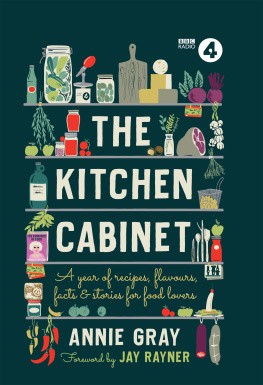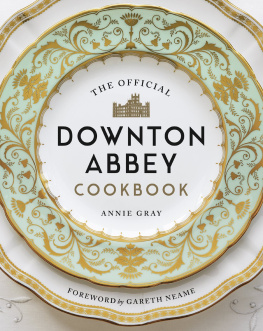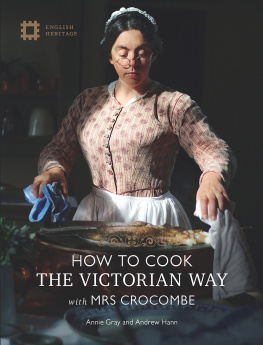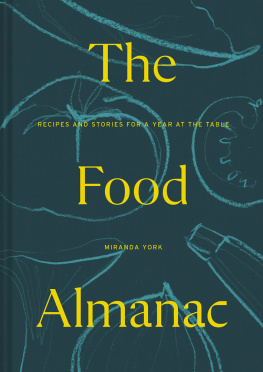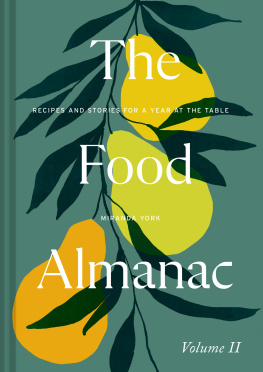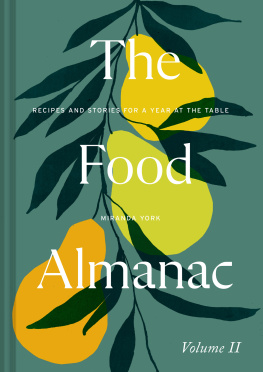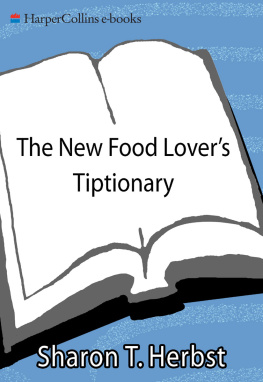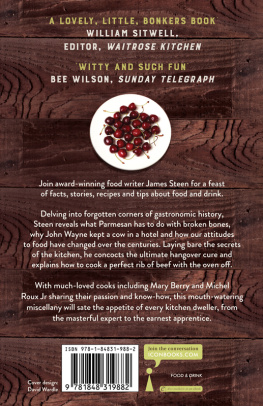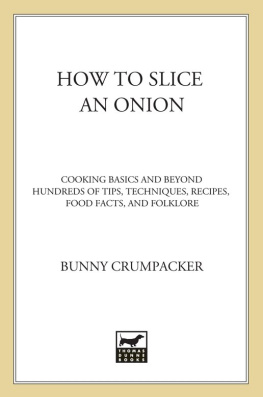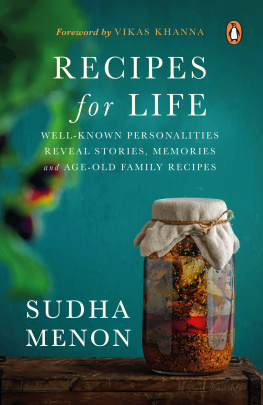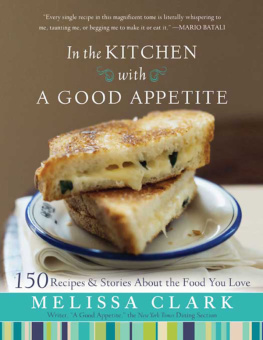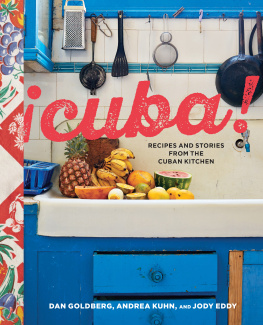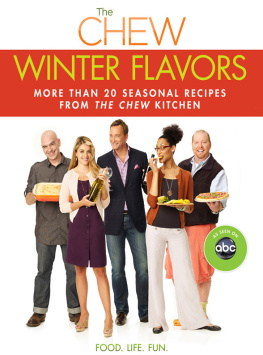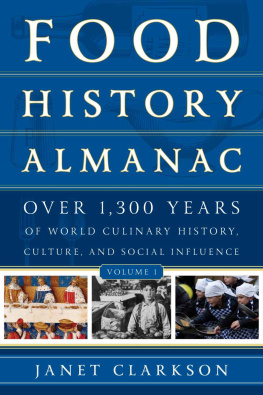
Foreword
Like many of the very best British ideas, The Kitchen Cabinet was born in a room above a pub: a dimly lit one near Londons Old Street roundabout, with modishly bare floorboards, trestle tables and the most functional of chairs. The non-broadcast pilots recorded there late in 2011 were a bare-bones affair. There was a tiny audience, mostly made up of staff from the production company who had been asked nicely if they wouldnt mind staying a little late that evening. There was a handful of food-based questions for them to read out, and two sets of potential panellists for them to put those questions to. Once the first lot of candidates had been put through their paces they were shifted out, and the next lot brought in.
I have been involved with many radio and TV show launches over the years. They always change markedly between the pilot and the programme that makes it to air. Not The Kitchen Cabinet. It was completely itself right from the very off: a seemingly loose-limbed, enthusiastic burst of bubbling food chat of the sort you might hope to find at the greediest of dinner tables.
In the early days of 2012, as the first trial series of four episodes became a second series of six, I would often hear people describe it as a kind of food version of Gardeners Question Time. They didnt know quite how right they were. The production company Somethin Else had not long before won the prized contract to produce the venerable BBC Radio 4 gardening show, which had been on the air since 1947. Having executed that successfully, without enraging the notoriously loyal Radio 4 audience, they had started thinking. Were there other subjects to which the format, such as it is a panel of experts, asked questions by an audience might be applied? Food was the obvious answer.
I was originally approached to try out as a panellist. I declined. It was obvious to me that the people who got that gig would need many qualities, chief among them being the ability to rattle off the outline of a recipe to order. After more than 20 years as the restaurant critic for the Observer, I do know my food. Im great at eating it, and not bad at writing about it. But the recipe thing wasnt a part of my skill set. I grandly suggested they let me have a go at chairing this new show instead. Im grateful they gave me a shot.
Because I was spot on. Even during those try-outs above the pub, it became obvious that being a Kitchen Cabinet panellist would be a tricky job; one that the panellists would have to make look easy. Of course, they do need to be able to do the instant recipe thing. A particular food specialism is important too; we want a show that represents and reflects the myriad cultures that make up the UK, through those communities cooking traditions. But they also need to have a hinterland, a world beyond the table, which enables them to place those dishes in some sort of context. They need a grand store of anecdotes and opinions, strongly held, however ludicrous. The Kitchen Cabinet is nothing if its not entertaining.
The panellists need to be extroverts who are ready to grab their moment, but also team players who know when to shut up. They need to be the kind of people you want at your table. Early on, we concluded that this was not really a job for the legions of celebrity chefs who were already hogging the airwaves. They obviously know their stuff, but that doesnt necessarily mean they would be great at communicating it. We are certainly not against a bit of formal training. A number of our panellists are classically trained chefs. More importantly for us, however, is the fact that those trained chefs also happen to be hilarious. We have food writers, well-travelled wits and raconteurs, cookery competition winners, and academics covering a variety of food and cooking disciplines. I may be biased, but I think we really have assembled the dream dinner-party guestlist. On page xv youll find a full cast list of The Kitchen Cabinet regulars whose wisdom, and belly-obsessed take on the world, has contributed to this book.
As we started our journeys around Britain, crisscrossing the entire UK, from its southernmost tip to its northernmost cities, from Belfast to Cardiff to Edinburgh and back again, one thing became clear. Having a knowledgeable panel was great. It was essential. But our live audience is what really makes The Kitchen Cabinet. On youll find one of this books Tea Breaks. It describes how each episode is put together. We want the show to sound freewheeling and effortless. Achieving that takes serious effort. We spend a lot of time choosing our subjects for each week, depending on the season and where were going to be, discussing them with our panellists and guests, and coming up with the outline of a script.
But its the audience questions, selected in the hour before we start recording, that are the shows beating heart. Id be lying if I pretended we didnt go hunting for certain questions to fit the direction that the themes weve prepared are going. But if a belter of a question comes in, well throw stuff out just to make room for it. And even if we dont broadcast them all, we always have space in the script for four general questions, which could be about anything at all, and usually are.
Even in the spring of 2020, when the pandemic forced us to halt recording the show in front of live audiences, those questions remained front and centre. We solicited them from social media and via email. Later, when the BBC created a piece of tech allowing for a virtual audience, we were able to record the show in front of some of the largest crowds wed ever had and take their questions in person, even if some of those people were probably sitting on their sofas in their underwear. After all, we have never had a dress code.
From the start, we knew what The Kitchen Cabinet was not about: dietary advice, nutrition, food poverty, economics, politics and ethics. Not because those subjects arent important. Theyre absolutely crucial, but they are also covered by other programmes on the BBC. We are here to chat, not lecture. That said, our broad historical and cultural approach to the joys of eating means we often do get into this stuff, but in a historical context.
There is, for example, a variety of stews made across the UK, each with different names: the likes of Liverpools lobscouse, the Lancashire hotpot and both Monmouth stew and cawl from Wales. I now know better than to claim they all have exactly the same recipe. As weve learnt on our travels, the way to make regional dishes can vary even from household to household. But at base, they came about in the same way: from the need to stretch a small amount of, perhaps, the less prime cuts to feed the maximum number of people. We are fascinated by origin stories like this: of pies and pasties, of smoked foods and long-stewed vegetable dishes. We are intrigued by the way the earliest of mass food producers influenced whats on our shelves today, and how class divides have defined the way we eat now. We are here for it all.
And were here to taste it all. Possibly the bravest thing we did was put eating noises on BBC Radio 4. At the live recordings, the panellists table has always ended up being laid with a ludicrous and wantonly random buffet of dishes, some specific to the place we have been visiting, others made by the panellists themselves. The tasting of those foods quickly became a feature of the show. Partly, I think that was because it required me to ask the team to talk with their mouths full or while dribbling profusely. Somehow, we seem to have been forgiven for our terribly bad manners.
Next page
